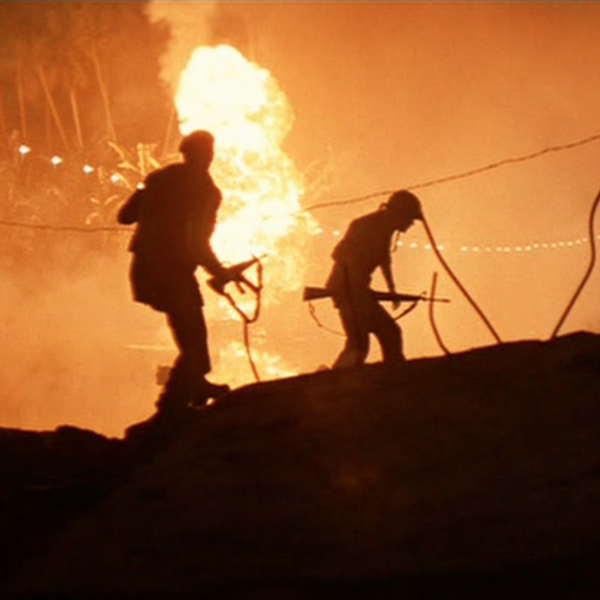Indian Dunes was a ranch that due to its large variety of different landscapes including planes, hills, and forests, one could never quite guess where it was located. It easily could have been Japan, Vietnam, Africa, or just about any location that to which the average American has never been. In reality, it was only a few dozen miles from Six Flags Magic Mountain in California. Because of its uniqueness and proximity to Hollywood, it became a favorite filming location of movie and TV producers and directors. Films and television shows as varied as "The Color Purple" and "China Beach" were filmed on the 600-acre ranch. Indian Dunes was also the location of actors Vic Morrow, Myca Dinh Le (age seven) and Renee Shin-Yi Chen's (age six) deaths.
On July 23, 1982, Twilight Zone: The Movie was being filmed on Indian Dunes. Vic Morrow, playing a bigot transported back in time, was supposed to carry two young Vietnamese children (Myca Dinh Le and Renee Shin-Yi Chen) through a river while a helicopter flew around above them and explosions went off. Dorcey Wingo, a Vietnam War veteran, was piloting the helicopter and was asked to make a 180 degree turn while a mortar effect occurred. Unfortunately, the explosion went off at the wrong time. A rotor flew off the helicopter and the helicopter spun uncontrollably. Morrow, who was at the moment trying to pick Renee Shin-Yi Chen out of the river while also carrying Myca Dinh Le, was crushed. Once the disaster was fully assessed, it was discovered that Morrow and one of the children had been decapitated. The other child kept their head, but not their life.
At first, this horrible occurrence seems accidental. One might even say, "Of course all the proper precautions were taken." Once learning more, that same person would question whether "all the proper precautions were taken" or not. Twilight Zone: The Movie featured the work of four directors: John Landis, Joe Dante, George Miller, and Stephen Spielberg. John Landis was the director of Vic Morrow's segment entitled "Time Out." Like most directors, Landis was heavily involved in every scene he was directing in the film, especially the helicopter scene. He was determined to get the best shots. Some might say so determined that he didn't take into account the danger or even care about the danger. According to Randall Robinson, an assistant camera man working on the film, John Landis (upon seeing the ill-timed explosions) told the helicopter crew to "Get Lower!" despite the clear dangers.
For the next decade, both criminal and civil charges were brought against John Landis, Dorcey Wingo, associate producer George Fosley Jr., Paul Stewart (explosives expert), and Dan Allingham (production manager). During the legal proceedings, more information about the film staff's questionable actions came out. This included the parents of the killed children claiming that they were told there would no danger. They also were never told about the helicopters or explosions that would occur. In addition, George Fosley Jr. asked the parents not to tell firefighters that children were on the set. This may have been due to the fact that both of the children were not legally allowed to work on the film since Landis had not obtained the permits required by California's child labor laws at the time.
In the end, everyone was acquitted (though millions of dollars in damages were awarded to the families of the deceased), Stephen Spielberg ended his friendship with John Landis, and most concerning, Twilight Zone: The Movie (including Vic Morrow's segment) was released.





















